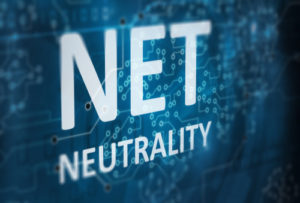
A partisan net neutrality bill offered by U.S. House Democrats won’t bring American consumers the internet protections they need, said U.S. Reps. Greg Walden (R-OR), Cathy McMorris Rodgers (R-WA) and Larry Bucshon (R-IN), who all voted against the proposal on Wednesday.
Their ‘nay’ votes, however, weren’t enough to stop advancement of the Save the Internet Act of 2019, H.R. 1644, which the full House voted 232-190 to approve this week. H.R. 1644, sponsored on March 8 by U.S. Rep. Michael Doyle (D-PA), now heads to the U.S. Senate for consideration.
“We all want an open and free internet – a permanent solution to ensure this phenomenon continues to power opportunity and innovation,” Rep. Walden tweeted on Wednesday following the House vote. “Unfortunately, Democrats refused to work in a bipartisan way to achieve that goal. Their solution is not real net neutrality. Net neutrality does not require a government takeover of the internet.”
H.R. 1644 would restore the open internet order of the Federal Communications Commission (FCC), according to the text of the bill, and would permanently reinstate the rules and legal interpretations set forth in the Report and Order on Remand, Declaratory Ruling, and Order in the matter of protecting and promoting the open internet that was adopted by the FCC on Feb. 26, 2015.
Reps. Walden, McMorris Rodgers and Bucshon contend that such regulation of the internet under Title II of the Communications Act of 1934, which originally was used to govern monopoly telephone companies in that era, would negatively impact small internet service providers (ISPs), particularly regarding their broadband expansion plans into rural communities around the country.
The members say H.R. 1644 basically would permit a federal government takeover of the internet and allow it near unlimited authority to regulate, tax and control the internet, Rep. Walden said, adding that such control is not necessary to protect online consumers.
“Republicans and Democrats agree more than they disagree on the key net neutrality parameters that protect a free and open internet for consumers,” he said. “The net neutrality ‘bright line’ rules Republicans support are simple and relatively easy to understand. No blocking. No throttling. No paid prioritization. Period.”
Rep. Walden on Feb. 7 introduced H.R. 1101, which would permanently prohibit blocking, throttling and paid prioritization for internet traffic, according to the bill’s text, and also would require that ISPs be transparent in their network management practices and prices. The bill has 14 GOP cosponsors.
Likewise, Rep. McMorris Rodgers also on Feb. 7 sponsored legislation modeled after her home state’s bipartisan law to restore portions of net neutrality without bureaucratic red tape.
The Promoting Internet Freedom and Innovation Act of 2019, H.R. 1096, would bar ISPs from blocking websites or charging more for faster delivery of certain sites in a way that benefits the broadband company and partner websites, according to a summary of the bill Rep. McMorris Rodgers provided. The bill has the support of 24 Republican cosponsors.
“Democrats say they want to ‘save the internet.’ However, in the time since Title II regulations were repealed under the Trump administration, network speeds are up drastically. Investment and coverage in rural areas has increased,” said Rep. McMorris Rodgers on the House floor. “This debate isn’t about the merits of an open Internet. I support an open, free Internet and I always have. This is truly about how we shape the future of our economy.”
Rep. Bucshon said the House-approved H.R. 1644 would reimpose heavy-handed regulation to control the internet.
“In 2015, under the Obama administration, the FCC abandoned the light-touch regulatory approach to internet governance that both parties had previously pursued for almost two decades,” Rep. Bucshon explained. “Instead of working toward 21st century solutions to moderate 21st century high-tech companies, they opted for an antiquated regulatory scheme designed for the monopoly telephone carriers of the 1930s. This caused investment in internet services to fall by 5.6 percent, or $3.6 billion.”
In 2017, under FCC Chairman Ajit Pai’s leadership, the FCC then adopted a rule restoring “the light-touch approach to internet regulation,” Rep. Bucshon added, which cleared the way for more innovation and investment and spurred a competitive marketplace.
“House Democrats are now trying to reverse the ruling of Chairman Pai’s approach and to bring back the same heavy-handed, antiquated regulations that caused the growth of the internet to slow down in the first place,” he said. “However, you don’t need to impose the heavy hand of Washington to protect consumers.”
Another option, the congressman said, is to protect consumers through “a robust and innovative marketplace” that gives them more choices.
“The internet is not in need of saving, and contrary to its name, the Save the Internet Act would not rescue the internet,” Rep. Bucshon said. “Instead, it would hand over control of the internet to Washington bureaucrats and only further exacerbate the digital divide.”
Rep. Bucshon has cosponsored H.R. 1101 and H.R. 1096, as well as the Open Internet Act of 2019, H.R. 1006, introduced by U.S. Rep. Bob Latta (R-OH).



